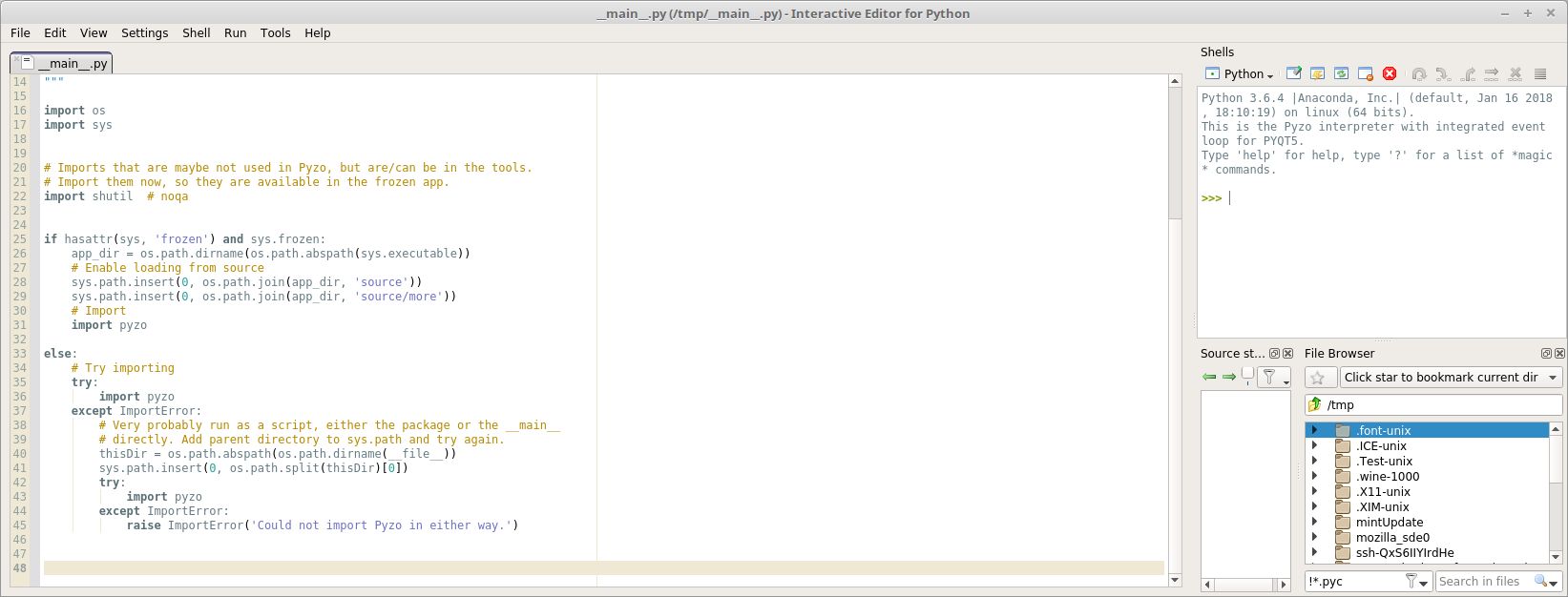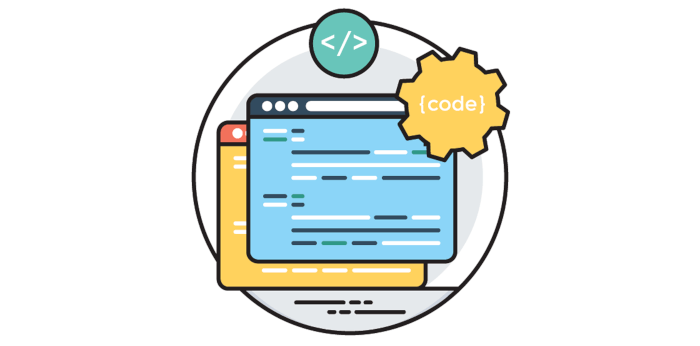Pyzo is a small, open source, cross-platform, Python IDE focused on interactivity and introspection. It’s a good environment for developers focused on scientific computing. Its practical design is aimed at simplicity and efficiency.
Pyzo consists of two main components, the editor and the shell, and uses a set of pluggable tools to help the programmer in various ways. Some example tools are source structure, project manager, interactive help, and a workspace.
The software is written in (pure) Python 3 and uses the Qt GUI toolkit. Binaries are provided for all major operating system which makes it quick to get started.
Pyzo uses code and concepts that are inspired by IPython, Pype, and Spyder.
Features include:
- Introspection information is queried from the active shell, and from the source code (by continuously parsing the file in a separate thread).
- Auto completion for any object in the active Python session and all __builtins__.
- Optional auto completion for Python keywords.
- Auto completion for functions, classes, and class attributes defined in the current file in the editor (taking inheritance into account, even if a super class is defined in the shell).
- Shows signature of functions (from the shell or from the source) using a call-tip.
- Interactive help for all objects in the active Python session by moving up/down the auto completion list, by double-clicking on a name, or by filling in the name directly.
- Interactive help show the docstrings of properties (rather than of the returned object).
- Allows various ways to interactively run code.
- Using an intuitive shortcut editor, a shortcut can be created for any item in the menu.
- Choose between different Qt themes.
- Full Unicode support in both editor and shell.
- Editor:
- Supports auto indentation.
- Automatically determines the indentation width when loading a file.
- Matlab-style cell system to mark code sections (by starting a line with ‘##’).
- Syntax highlighting for Python, Cython, C, and more to come.
- Supports commenting and uncommenting selected lines.
- Drag-‘n-drop files or directories to open them.
- Find/Replace (also supports regular expressions).
- The line ending style can be changed.
- Optionally use tabs, or insert tabs as spaces.
- Indentation guides.
- View whitespace / line endings.
- Zooming.
- Undo / redo.
- Highlighting of current line.
- Long line indicator.
- Choice of multiple fonts, Pyzo comes with two attractive fonts.
- Breakpoints for debugging.
- Various handy tools included, plus the ability to make your own.
- File browser – list all files in your projects by bookmarking the directories of your projects. Easy switching between projects.
- History viewer.
- Interactive help – displays help information interactively (on selection and scrolling through an autocompletion list).
- Logger – a logger shell that displays Pyzo’s log messages and can be used for development or for changing advanced settings.
- Source structure – lists the structure of the source in a tree widget. It can list classes, functions (and methods), import statements, cells, and todo items.
- Web browser.
- Workspace – lists all variables (also in debug mode).
- Export to PDF.
- Syntax parsing: Python, Python 2, Python 3, Plain, C, sexpr, cpython, and wat.
Website: www.pyzo.org
Support: Guide, GitHub Code Repository, Mailing List
Developer: Almar Klein and many contributors
License: BSD License

Learn Python with our recommended free books and free tutorials.
Return to Python IDEs | Return to Integrated Development Environments
| Popular series | |
|---|---|
| The largest compilation of the best free and open source software in the universe. Each article is supplied with a legendary ratings chart helping you to make informed decisions. | |
| Hundreds of in-depth reviews offering our unbiased and expert opinion on software. We offer helpful and impartial information. | |
| The Big List of Active Linux Distros is a large compilation of actively developed Linux distributions. | |
| Replace proprietary software with open source alternatives: Google, Microsoft, Apple, Adobe, IBM, Autodesk, Oracle, Atlassian, Corel, Cisco, Intuit, SAS, Progress, Salesforce, and Citrix | |
| Awesome Free Linux Games Tools showcases a series of tools that making gaming on Linux a more pleasurable experience. This is a new series. | |
| Machine Learning explores practical applications of machine learning and deep learning from a Linux perspective. We've written reviews of more than 40 self-hosted apps. All are free and open source. | |
| New to Linux? Read our Linux for Starters series. We start right at the basics and teach you everything you need to know to get started with Linux. | |
| Alternatives to popular CLI tools showcases essential tools that are modern replacements for core Linux utilities. | |
| Essential Linux system tools focuses on small, indispensable utilities, useful for system administrators as well as regular users. | |
| Linux utilities to maximise your productivity. Small, indispensable tools, useful for anyone running a Linux machine. | |
| Surveys popular streaming services from a Linux perspective: Amazon Music Unlimited, Myuzi, Spotify, Deezer, Tidal. | |
| Saving Money with Linux looks at how you can reduce your energy bills running Linux. | |
| Home computers became commonplace in the 1980s. Emulate home computers including the Commodore 64, Amiga, Atari ST, ZX81, Amstrad CPC, and ZX Spectrum. | |
| Now and Then examines how promising open source software fared over the years. It can be a bumpy ride. | |
| Linux at Home looks at a range of home activities where Linux can play its part, making the most of our time at home, keeping active and engaged. | |
| Linux Candy reveals the lighter side of Linux. Have some fun and escape from the daily drudgery. | |
| Getting Started with Docker helps you master Docker, a set of platform as a service products that delivers software in packages called containers. | |
| Best Free Android Apps. We showcase free Android apps that are definitely worth downloading. There's a strict eligibility criteria for inclusion in this series. | |
| These best free books accelerate your learning of every programming language. Learn a new language today! | |
| These free tutorials offer the perfect tonic to our free programming books series. | |
| Linux Around The World showcases usergroups that are relevant to Linux enthusiasts. Great ways to meet up with fellow enthusiasts. | |
| Stars and Stripes is an occasional series looking at the impact of Linux in the USA. | |
